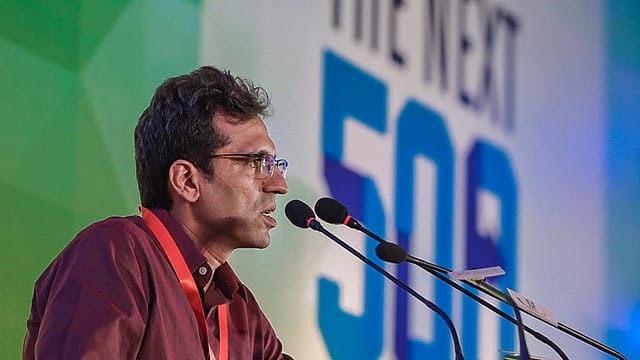Disruption is a constant threat: Hitesh Oberoi
ADVERTISEMENT

Disruption is a constant threat in the digital world if organisations do not evolve, tap opportunities, and hire the right people, said Hitesh Oberoi, MD & CEO, Info Edge (India) at the Fortune India Nest 500 summit in New Delhi.
Addressing a gathering of leaders and executives from the country’s largest midsize companies, Oberoi said that it is crucial for organisations to invest in people with the right skills. “Promoters can bring in limited bandwidth and it takes quality people with leadership skills to grow an organisation rapidly in order to prevent investments going waste,” he added.
To do that well, Oberoi said that companies need more management depth to drive innovations and high growth. And there is a need to build the right kind of culture and environment to retain talent. “It is very hard to innovate in a silo,” Oberoi said.
In his leadership talk at the summit, Oberoi shared the digital journey and growth strategy of Info Edge – which ranked 124 in the Fortune India Next 500 2019 list, and runs websites like Naukri.com, 99acres.com, JeevanSathi.com and Shiksha.com.
Oberoi, who co-founded the Internet startup with Sanjeev Bhikchandani in the pre dot com bust era talked about how the company raised ₹7 crore at an enterprise valuation of ₹50 crore when its revenue stood at around ₹30 lakh. “Back then, the Internet just had a few thousand users hooked to itself in India,” Oberoi told the audience. “Info Edge got rich valuations due to the dot com boom,” he added.
But soon after the dot com bubble burst in early 2000, leaving Info Edge with few tough years and a surety that they would not find another round of investment in their venture. Recalling the tough time, Oberoi while advising his Next 500 peers, talked of harder focus on products and customers. The same paid off for Info Edge, which saw a dream run in the days following the dot com bust and brought out its initial public offering (IPO) at a market value of ₹300 crore. “There was very limited understanding of the dot com world even in 2006-2007,” Oberoi said. “Info Edge was compared to the IT companies like Infosys and TCS,” he added.
Oberoi underlined that like many businesses, Info Edge too had a cyclical nature of business. He said that post-IPO the global financial meltdown of 2008 brought about a tough phase for Naukri – which was earlier growing at an annual average of 50-70% in top-line. “The pain lasted for nearly six quarters off which we saw four quarters of 25% decline in our top-line,” Oberoi said. But despite the odds, Naukri was not a loss-making business, it kept seeing lower profits in testing times. Even at the current revenue base of ₹1,200 crore, Naukri generates operating profit of ₹430 crore with a 55-60% margin. Info Edge commands a market capitalisation of ₹27,000 crore.
To tide over the cyclical challenge, and also to ensure that the money the company made was put to better use and not just returned back to shareholders, Info Edge decided to avoid going international and diversify its offerings. Diversification remained its key strategy and lead to the launch of 99acres.com and JeevanSathi.com. “From facilitating online meetings of job seekers and job providers, the focus diversified to real estate and matrimony,” said Oberoi.
This strategy also meant that Info Edge, which once tapped the investment market as an investee, was scouting opportunities as an investor in smaller companies in 2008. “We saw lot of opportunities in India but did not have the management bandwidth,” Oberoi said. “But we had the money to invest,” he added. Interestingly, Info Edge managed to rope in investors before the dot com bust, and as an investor it pumped investment in PolicyBazaar.com just before the financial meltdown. Following that, Info Edge has deployed over ₹1,200 crore in 20 different companies including food delivery platform Zomato.
Info Edge’s ‘invest in tiny companies’ strategy also paid off well mainly because of its four key acquisitions over the years. The first acquisition – MakeSense Technologies – which built good search engines helped Info Edge improve the quality of its own search engines. Next acquisition – TooStep – helped Naukri to offer an otherwise non-existent recruitment automation system which now has over 2000 customers for itself. AmbitionBox was Info Edge’s third acquisition which was conceived as India’s GlassDoor, capturing employee’s ratings and reviews for employers.
“Today, AmbitionBox has more reviews than GlassDoor in India,” Oberoi said. Lastly, Oberoi talked about Naukri’s recent acquisition of IIMJobs.com which operates in the premium segment and very popular with graduates from various Indian Institutes of Management (IIMs). “The acquisition strategy has inspired us to get into newer areas with focused people to drive growth for us,” Oberoi said.
Beyond investing in outside opportunities, Oberoi advised the Fortune India Next 500 delegates to invest in internal innovations efforts too. Oberoi shared that in the inception years, Info Edge had a tiny product team while the larger focus was on sales and marketing. But, in the last few years, Oberoi said that his company’s scope of investment in its products and designs has been on a rise. “Today, we have 500 people deployed in the mission critical areas with clear intent to upgrade the quality of the talent,” he said.
He also talked about the importance of staying relevant as the world is changing very rapidly. “Seventeen years ago we were just like Yahoo as people just had to browse for jobs,” said Oberoi. “Over time we had to invest in technology to build high quality search engines,” he added.
He also talked of how seven years ago Info Edge had to quickly transition to mobile platform as 90% of the desktop traffic was reduced to 15% . “We had to design from scratch because what works for big screen does not work for small screens,” Oberoi said.